D.P.: Episodes 1-2 (Review)
by missvictrix
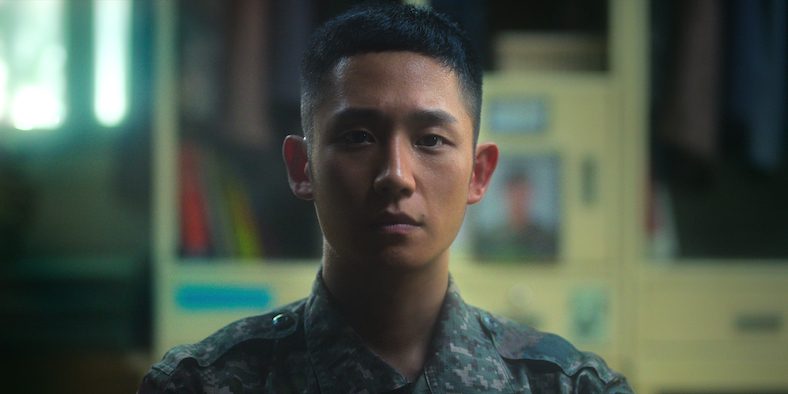
Netflix’s latest original drama is here, and oof, it’s a heavy one. D.P. is a military drama that’s as rough as it is uncompromising. Don’t let those early teasers trick you — there’s very little lightness here, and instead, a whole lot of bullying, torment, and miserable young men.
Note: Coverage will be limited to this review.
EPISODES 1-2 REVIEW
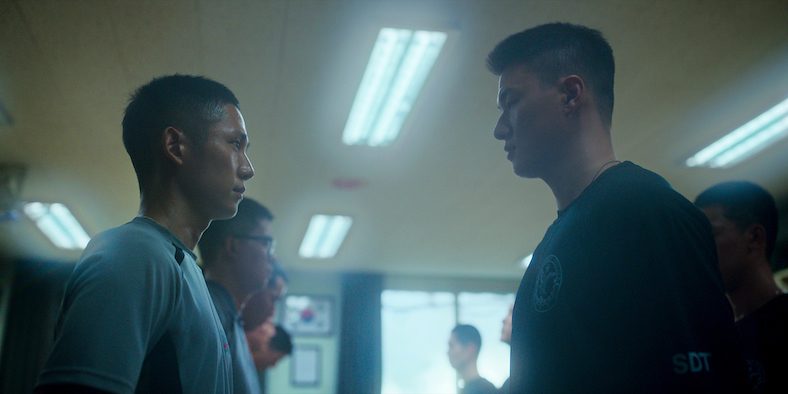
I love a good military story and have many under my belt, but perhaps because Netflix Originals are couched in the clothing of K-dramas, I always seem to get thrown off by the content, and the way the content is handled. And D.P. is no exception. There isn’t the tiniest glimmer of K-drama-ness here; instead, we have a Netflix miniseries that happens to be told in the Korean language. It’s not happy, it’s not hopeful, and it’s not exactly an enjoyable watch thus far — but it does what it set out to do, and that’s hit you in the gut.
We first meet our hero, PRIVATE AHN JUN-HO (Jung Hae-in), getting bullied in his military barracks. It’s a brutal introduction that will only get worse later, but first we bounce back in the timeline and see Jun-ho the day before his enlistment. The events of the day tell us a lot about the drama we’re going to get: Jun-ho meets injustice at basically every turn — and meets it with the straight face of someone who’s used to being on the bottom, and half numb to the world around him. Still, he has a strong sense of right and wrong, and a personality that makes it easy to relate to him, even when we know so little about him.
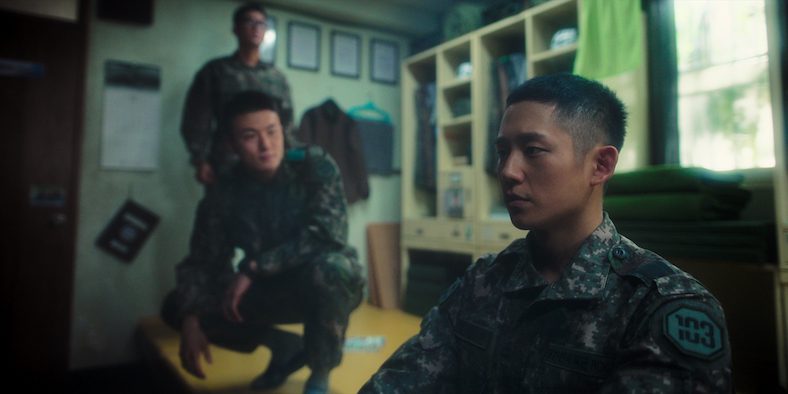
When he’s accused of stealing 500 won, he calmly confronts his accuser that he did not. When his boss fires him and refuses to pay him the wages owed, Jun-ho calmly leaves as instructed… but steals a scooter on the way out to take his rightful pay. The details don’t matter here as much as what we learn about Jun-ho, whether it’s his sense of justice, how he interacts with others, or how his worldview has been shaped.
During his enlistment ceremony, Jun-ho is one of the only people in the stadium with no one to bid him farewell. There are family hugs and crying mothers and girlfriends running through the crowd, but Jun-ho just stands there, slightly removed from it all. His hardness on one hand seems to alienate him from people and relationships, but on the other hand, it just might turn out to be the coping mechanism he needs once he gets into the army.
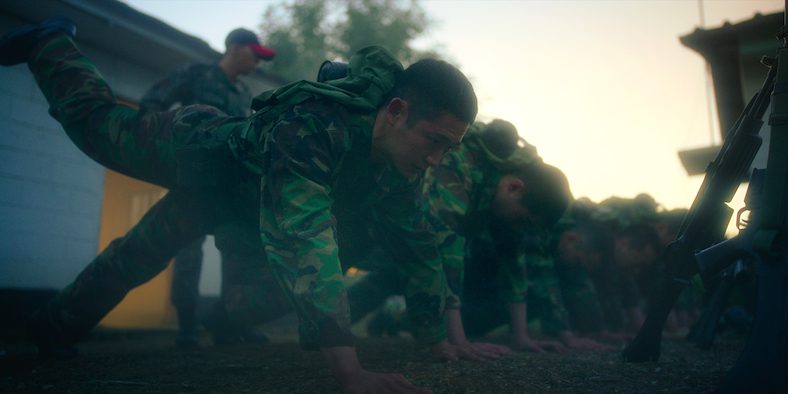
Basic training is torture for everyone, and we see snippets of this, mostly focusing on Jun-ho. As expected, his detachment seems to serve him well. It’s an actual real-life coping mechanism that many veterans have talked about: being able to pull yourself out of the hellacious circumstance you’re in, and giving your mind somewhere else to go to keep you from breaking down. Jun-ho seems to take endless punishment by his superior HWANG JANG-SOO (Shin Seung-ho), but in certain moments we see through his exterior; he is getting close to cracking.
Jang-soo is the token bully of the barracks who seems to live to humiliate and torture the new recruits — physically and psychologically. He seems to have a particular dislike for Jun-ho, and we soon circle back to our opening sequence where Jang-soo smacks Jun-ho (and the others) around. If they can’t hold the line where they’re supposed to stand, they get shoved back against the wall, where a particularly nasty-looking nail at head-level waits for them. It gives me the shivers.
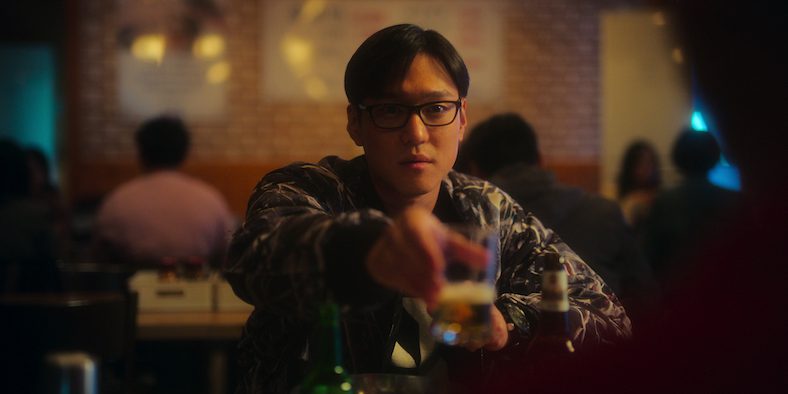
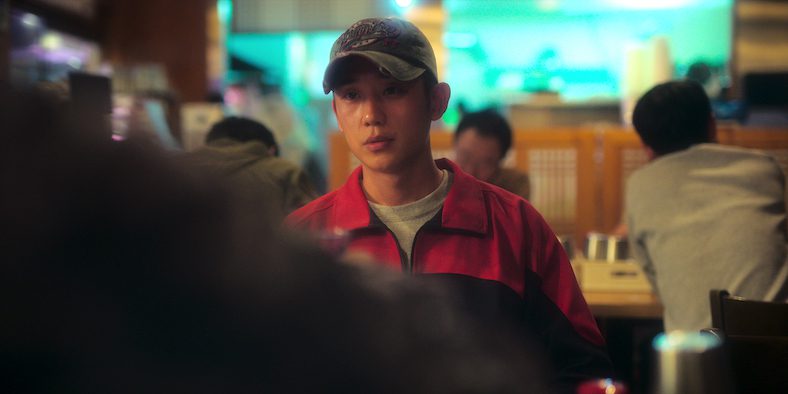
Because of Jun-ho’s height, he automagically joins the military police, and from there, through circumstance, timing, and his psychological acumen, gets appointed to the D.P. team. It’s a joke of the military that no one knows what D.P. actually stands for, but the mission is clear: they go into the real world dressed as civilians to bring back army deserters. The D.P. teams work in pairs, and Jun-ho is paired up with CORPORAL PARK SUNG-WOO (Go Kyung-pyo).
It’s hard to read Sung-woo exactly, but when they get sent to Gangnam to find a deserter, his character becomes clear. Rather than start their investigation, like Jun-ho keeps pressing them to, Sung-woo wants to party. They spend the whole night at a bar, drinking and smoking in excess.
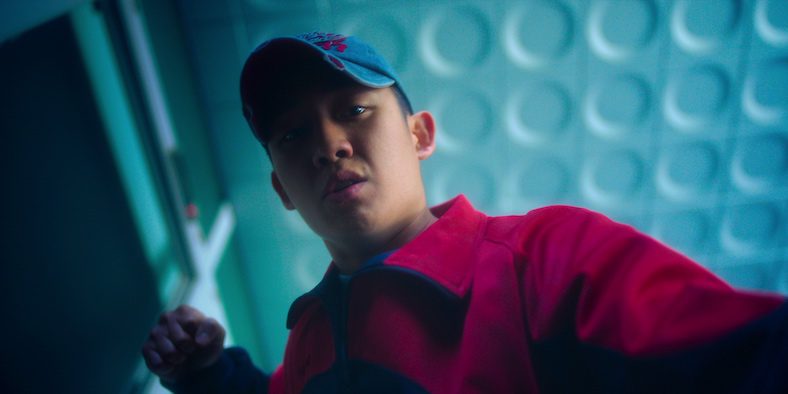
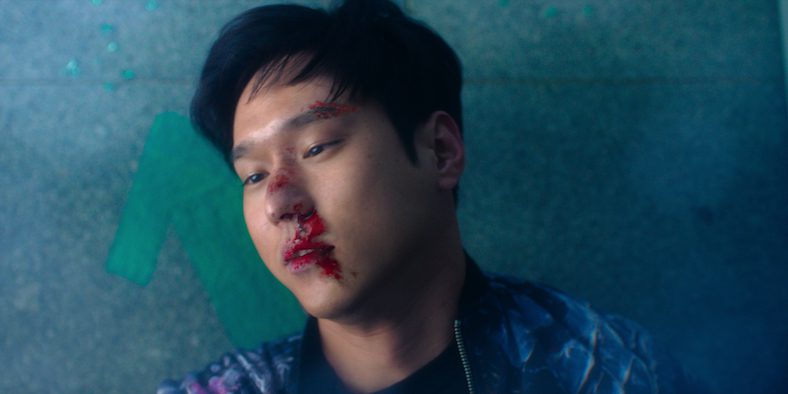
Jun-ho is clearly conflicted by their actions, but Sung-woo’s military rank means he has to fall in line — and it has dire consequences. Jun-ho goes outside the bar to smoke, barely conscious at this point. When a kid walks over and asks to use his lighter, Jun-ho gives it to him, saying he has two. It’s a small moment that will have a huge ripple effect: the young kid is in fact the very deserter they’re supposed to be looking for. He uses Jun-ho’s lighter to smoke himself to death in his motel room.
In the aftermath of this tragedy, Sung-woo only cares about hiding the truth and protecting himself. Jun-ho, on the other hand, is absolutely stricken about what’s happened and the inadvertent role he has played in the young soldier’s death. His emotions come out in one way, which is basically the same way everything in the drama is expressed: violence. Jun-ho beats Sung-woo to a bloody pulp, and while we’re watching this scene play out, we see that in his head, Jun-ho is actually punching (i.e., punishing and blaming) himself.
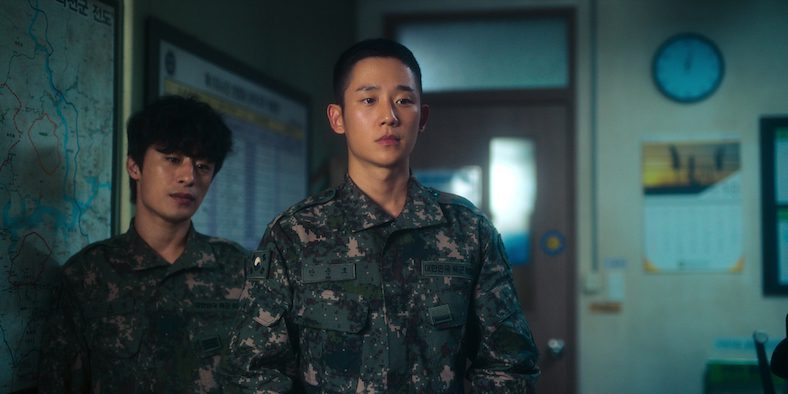
Jun-ho expects to be a goner after this incident, but enough of the truth is exposed, and it earns him a second chance. The original soldier from the D.P. team comes back from a stint in the military hospital, and he’s teamed up with Jun-ho. Here we meet CORPORAL HAN HO-YEOL (Gu Kyo-hwan), a total weirdo for sure, but one that takes his D.P. duties seriously.
The pair are given their next mission, and are set loose in the city with a warrant and 200,000 won for expenses. Jun-ho goes along with Ho-yeol’s usual methods of investigation, and it’s a dynamic that we’ve seen many times, but it still works: Ho-yeol is the oddball that seems strangely insulated from the brutalities around him. He has his own way of working, but he’s also not opposed to listening to Jun-ho. As the two carry out their investigation, we see not only the start of their partnership, but how Jun-ho’s insights can be put to good service. Episode 2 covers their first investigation, and ends with the successful arrest of a deserting private.
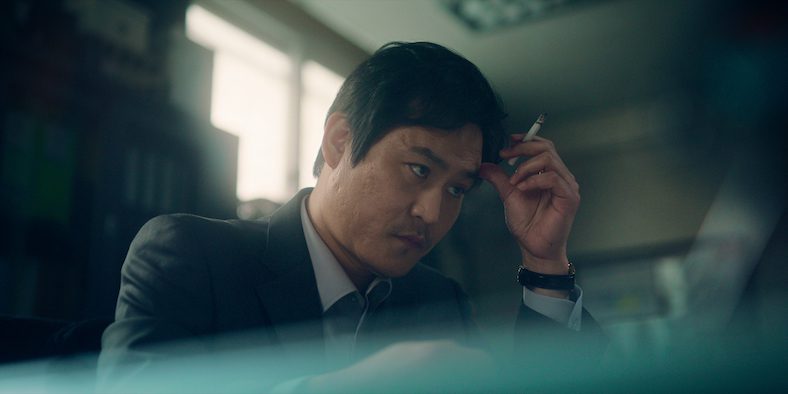
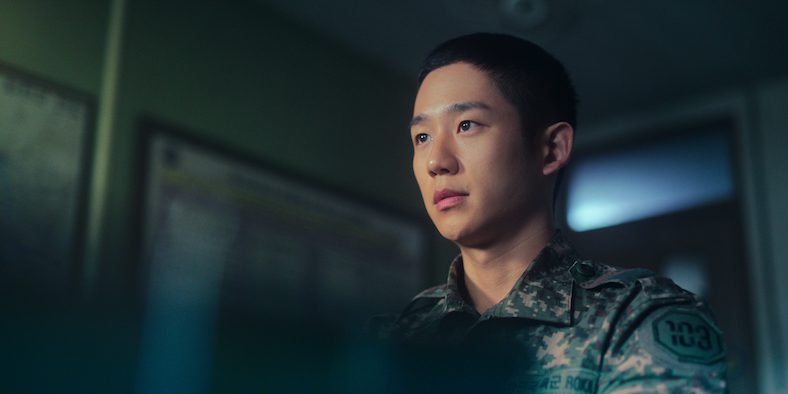
It’s probably a blessing in disguise that D.P. is only six episodes in total; it’s a lot of heaviness to take in, the half of which I haven’t even gotten to here. Suffice it to say the overall ethos of this world is one of real unhappiness. You get the feeling every character is just dragging themselves through by their claws, doing whatever it takes to survive the misery until tomorrow.
Even the higher ranking soldiers that are in charge of the military police are equally heavy and unhappy characters. Kim Sung-kyun is particularly great here, playing the D.P. team’s commanding officer.
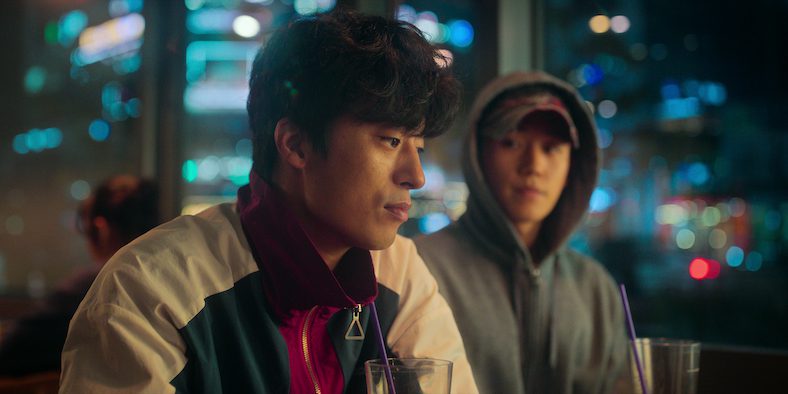
Though D.P. is set in the present-day, the way it’s shot, and the color palette used, gives the drama an older feeling. From aesthetics to emotions, it often feels like you’re watching one of the great U.S. films about the Vietnam War. In D.P. we don’t get a story of combat, but we do get the same emotions, the same color, the same slow drags on cigarettes, and the feeling of this really raw exposè of military life.
In addition to all the heaviness of the military setting, and the really heartrending backstories of the deserters (which I imagine will only get more so as the drama continues), we’re also able to glean a bit of information about Jun-ho’s family. This is just as dark and dire as the rest of the drama. He seems to come from an abusive family, and though he cares about his mother, was unable to bring himself to see her before his enlistment. Similarly, her letters to him stack up in the barracks; he is unable to open them.
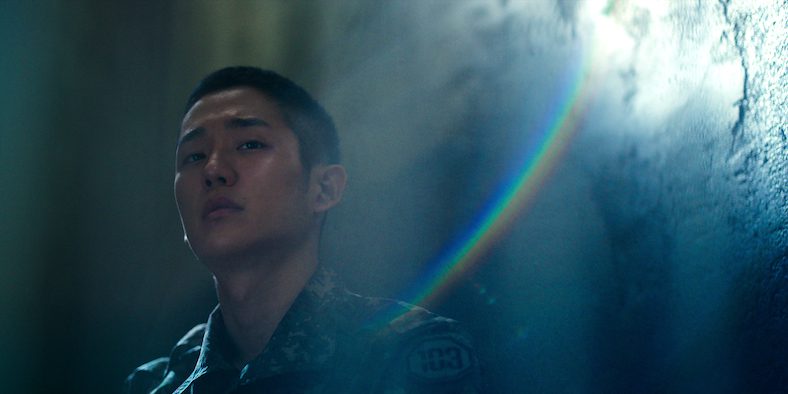
Jun-ho’s mother will likely play an important part in his own story, but the idea of mothers and comfort from a mother is referenced and inserted into this story again and again. I can’t think of where I originally heard it from, but there was a movie line that went something like this: in the end, when men die, they all cry for their mothers.
While the love of a mother might be used as a way to humiliate the new privates, in a deeper sense, it’s a current that’s running through this story, and something that (whether they want to admit it or not) unites us all. Whether it’s Ho-yeol saying how the deserters almost always reach out to their mothers, Jun-ho’s guilt and heartache around his own mother, or the fact that the deserter they catch is allowed a touching phone call with his mother, it’s hard to discount this element of the story.
Dark and depressing though D.P. is, it tells its story insightfully instead of gratuitously. I don’t want to exist in the world of this story any longer than I have to, but I do appreciate what it’s doing and the story it’s telling. It’s slower, darker, and harsher than we might have expected, but it’s a story worth experiencing.
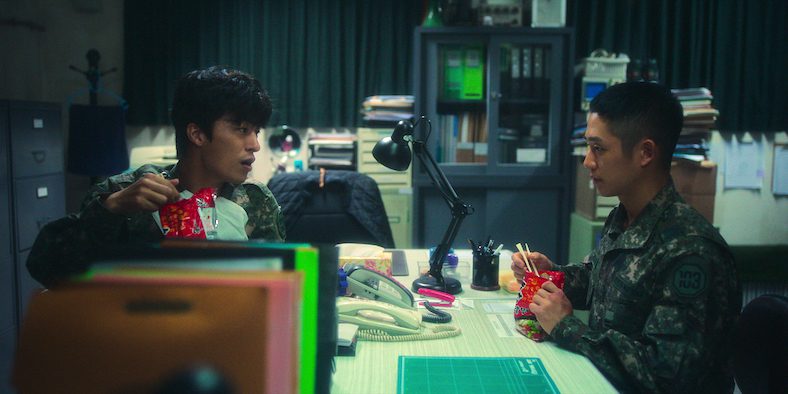
RELATED POSTS
Tags: D.P., featured2, first episodes, Go Kyung-pyo, Gu Kyo-hwan, Jung Hae-in, Kim Sung-kyun, Shin Seung-ho, Sohn Seok-gu
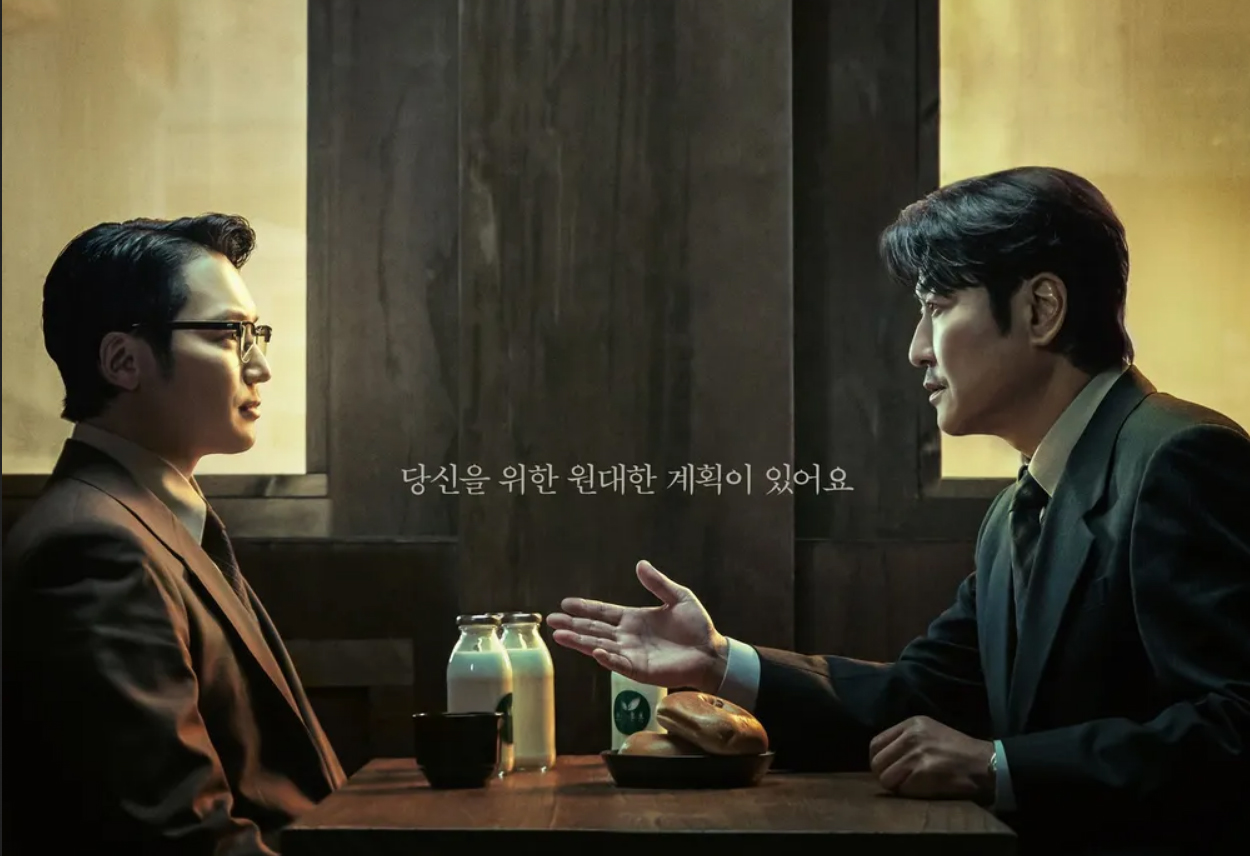
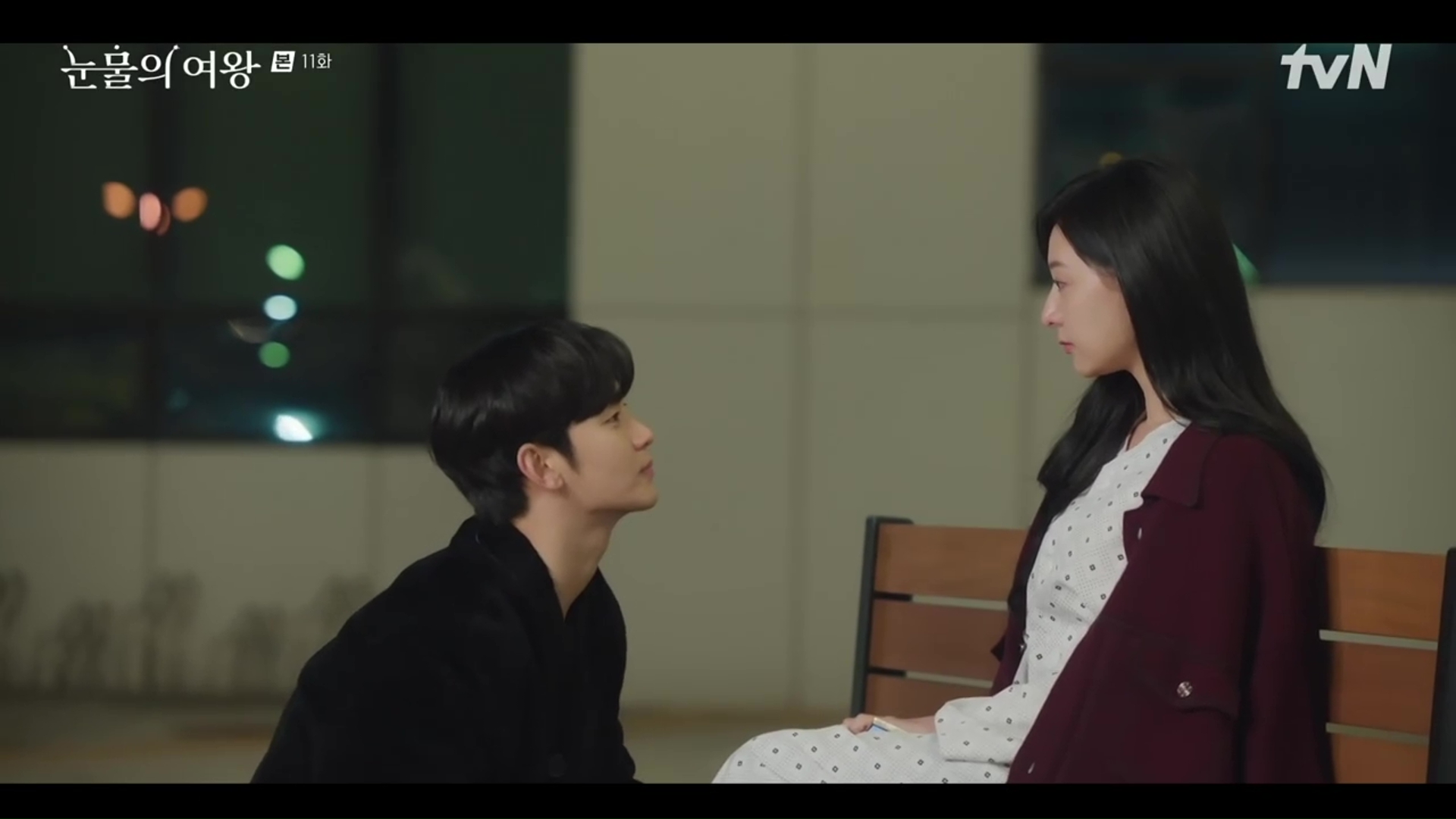
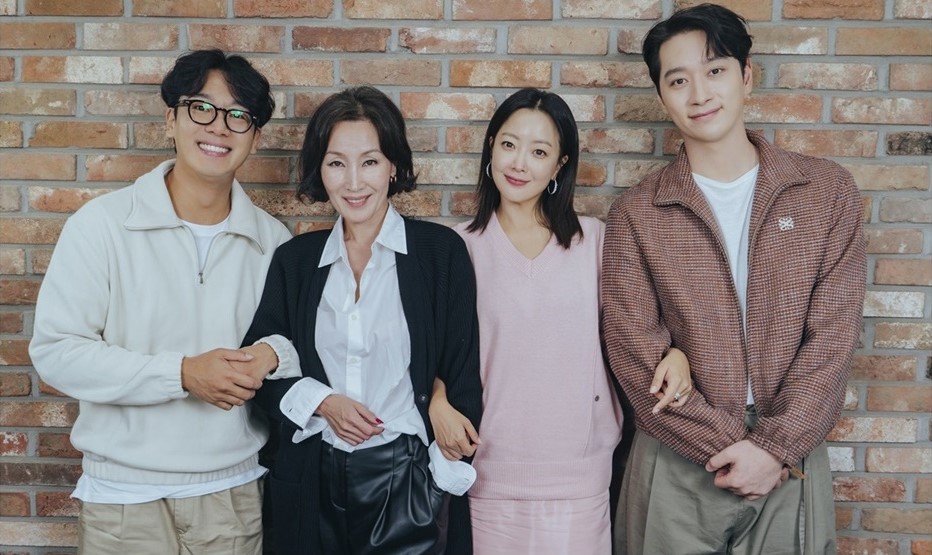
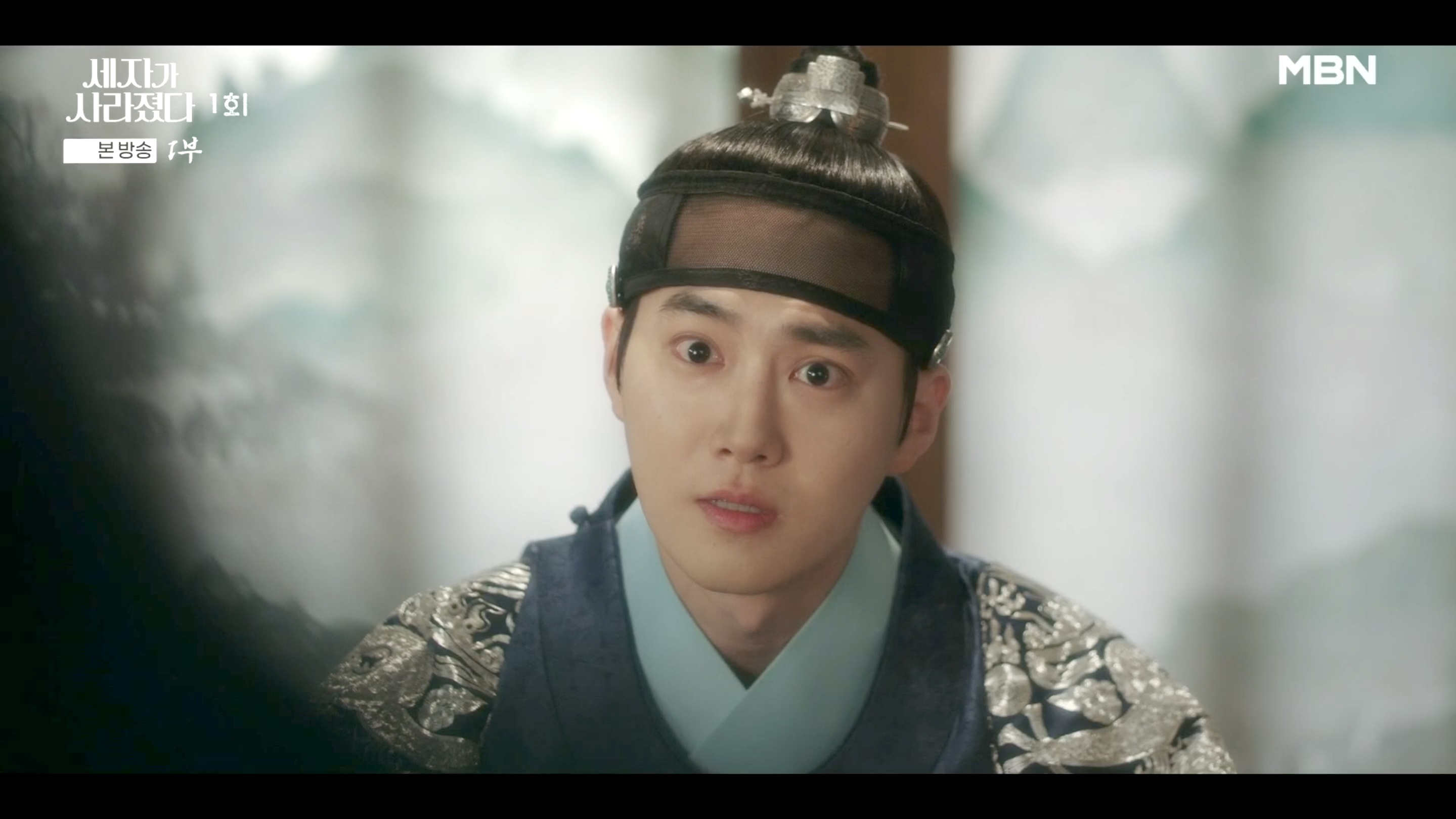
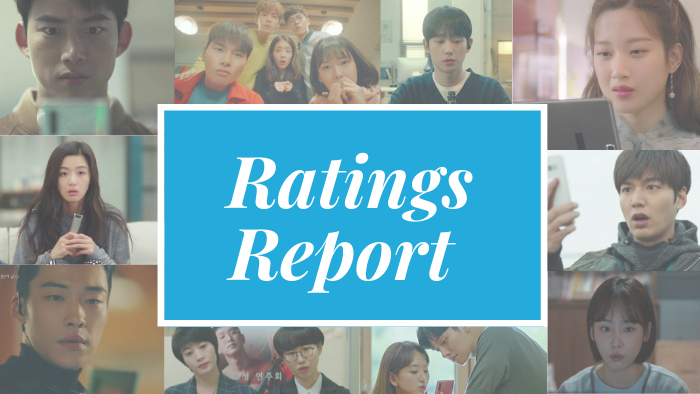
![[Beanie Review] Wonderful World](https://d263ao8qih4miy.cloudfront.net/wp-content/uploads/2024/02/WonderfulWorld_reviewb.jpg)
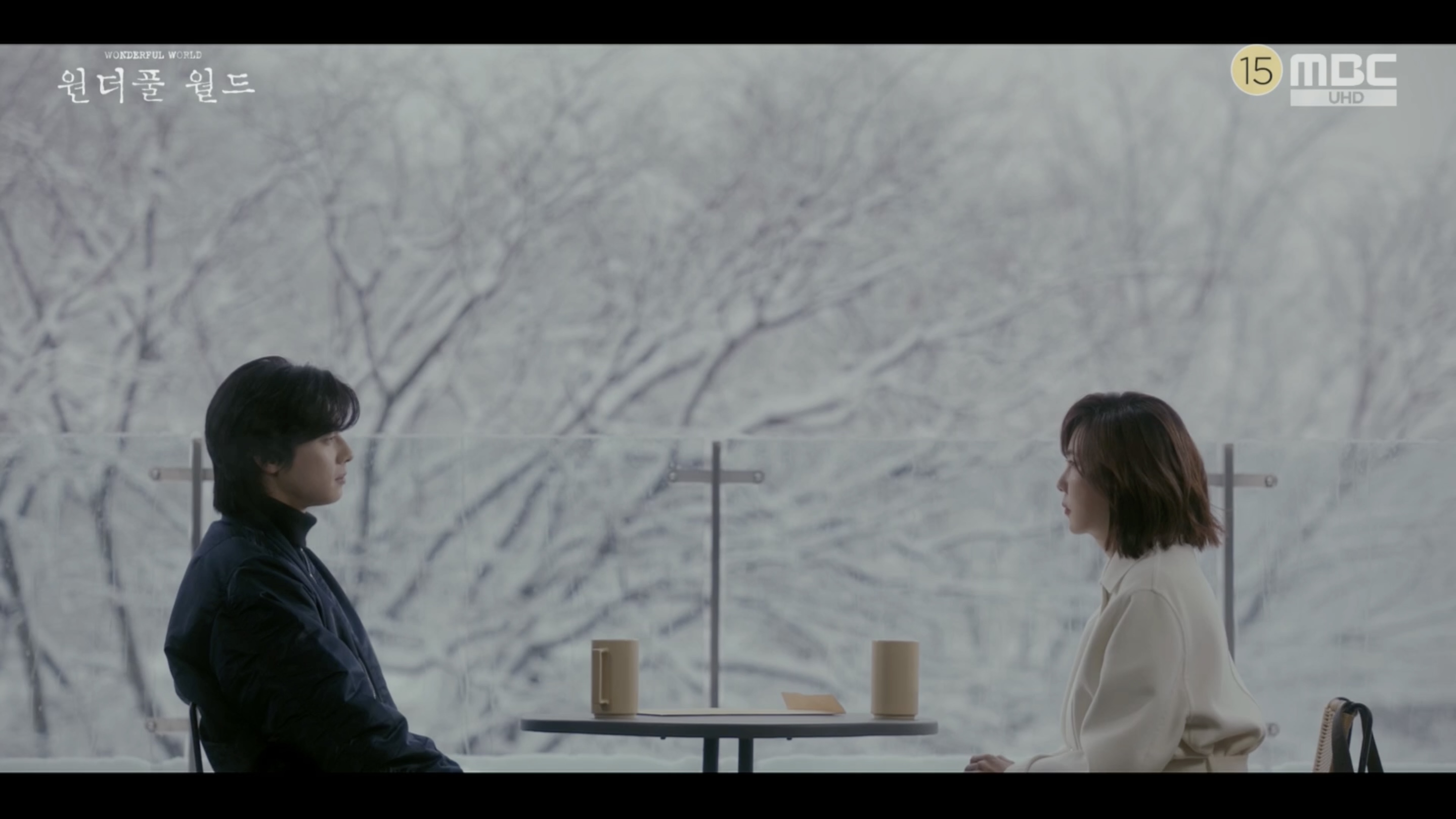
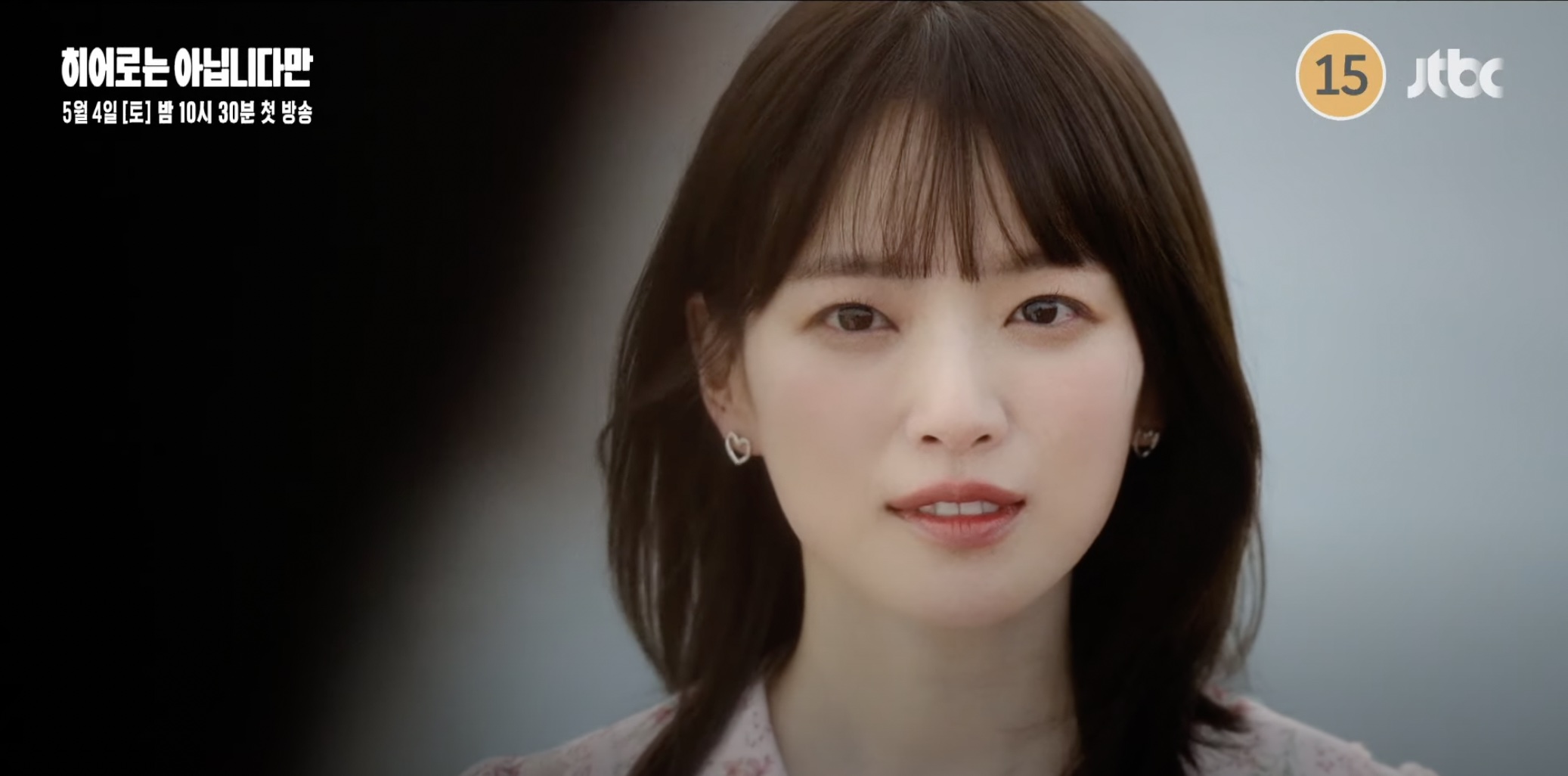
![[Drama Chat] PPL round-up: Chocolate and caffeine](https://d263ao8qih4miy.cloudfront.net/wp-content/uploads/2024/01/mmh34_0-scaled.jpg)
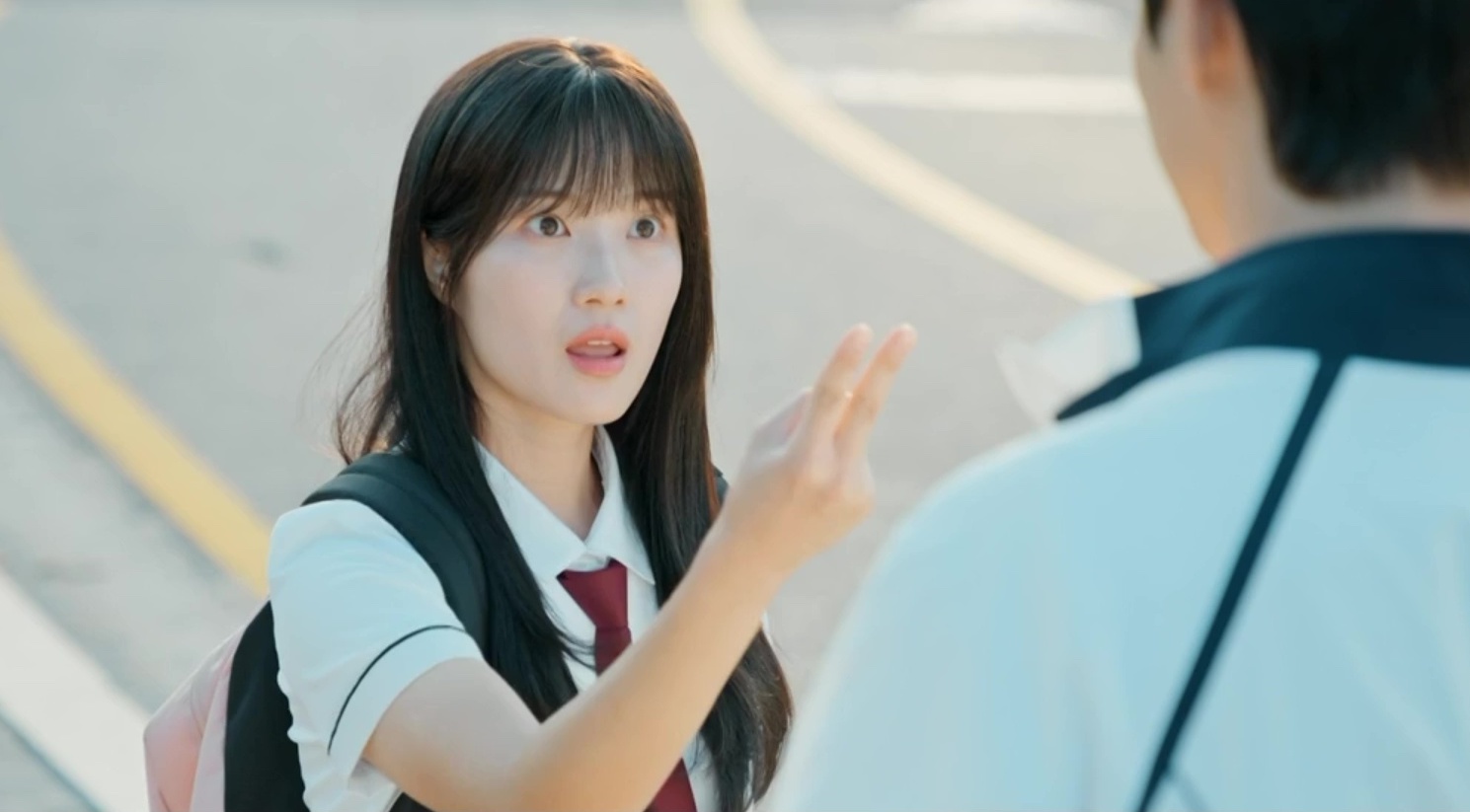
Required fields are marked *
Your email address will not be published. Required fields are marked *
1 tiredys
August 28, 2021 at 5:03 PM
Just finished the last episode and " I don’t want to exist in the world of this story any longer than I have to, but I do appreciate what it’s doing and the story it’s telling" summarizes this story very well.
Thanks for the review @missvictrix
Required fields are marked *
2 dramalover4ever
August 28, 2021 at 5:14 PM
I loved this and strangely enough was not depressed by it. In a way, it was a breath of fresh air to hear this very real story told. The dynamic between the two, Jun-ho and Ho-yeol was delightful. The moments in which they exercised their autonomy and got around the unthinking discipline demanded of them was also like a breathing space. I loved how they used their brains to track down the deserters, and I also appreciated their acknowledgement of the experiences that led to the desertions. The theme of mothers gets carried right through, but the takeaway for me was about being complicit in the bullying by turning away and not objecting. The drama shows us the power of a culture of bullying to pull everyone in and make them all participants. It all ends tragically and none are unaffected one way or another, but because the drama touches on a very real and ongoing issue in such an engaging way, I loved it to the point I couldn't stop watching, and I'd enthusiastically line up for another season.
Required fields are marked *
bil
August 28, 2021 at 5:38 PM
Yess for another season! the last scene made me shiver so I don't know how the writer will pull up the story again, but still there's another 500 days until Junho's discharge.
Required fields are marked *
dramalover4ever
August 28, 2021 at 6:44 PM
I'm expecting him to be a whistle blower, and for there to be an investigation.
Required fields are marked *
pohonphee
August 28, 2021 at 7:05 PM
*Spoiler*
Doesnt he run away or become the desserter himself at the last episodes? So no other season? Or there will the great drama twist?
Required fields are marked *
dramalover4ever
August 28, 2021 at 8:43 PM
*Spoiler* It seems well set up for another season. He's pretty much been destroyed by what happened and if his personality is anything to go by, he'll do something more than only run away.
Required fields are marked *
FormAnOrderlyQueue
August 28, 2021 at 9:10 PM
*Spoiler*
Yes, I'm pretty sure his final choice was to desert. Something broke inside him when he saw the way Suk-bong (?) died. However, personally, I'd rather they just left it there with no season 2 - the lack of closure to his story adds to the bleakness of it all. Another lost and broken soul wandering off without hope of things being addressed or fixed. That seemed to be the pattern of almost all the deserters - and was one of the more moving parts of the drama for me - they were sent back to the same awful situation that had caused them to run in the first place. There was no, "It'll be better this time" hope. So it would make sense to me if Jun-ho's story was never completed but left broken.
Required fields are marked *
pohonphee
August 28, 2021 at 9:25 PM
I'm in no 2nd season team.
ha ha
dramalover4ever
August 28, 2021 at 10:14 PM
I can see that. It does stand by itself as a single season, and eloquently too. A second season would set it up for closure, but maybe that's asking for a happy ending when nothing has changed.
It's funny. I've always thought that the military service system was rather heroic. Every man in SK knows how to be part of a fighting unit, unless of course they manage to evade the call up. But from this, it is a process of brutalization. It's probably not as dire as this, although recent real events are pretty horrible.
I'm also wondering what difference it has made to SK society overall. If compulsory military service did not exist, how different would the men be?
I can't imagine either what it's like to live in country that is constantly battle ready. In know in Suisse, the famously neutral country, even my landlady owned and knew how to use a gun. The whole country is always ready to mount the barricades. Yet both of these countries are notoriously peaceful and shootings are non-existent, if not extremely rare. A pile of paradoxes.
pohonphee
August 28, 2021 at 11:07 PM
I want to believe that the world has been developed this far, all the progress in science and medicine that we dont need more guns to protect our selve and family. It really saddens me to know no matter how much and far we have come, we still need gun to solve things.
Dramas/movies about bullying always get my nerve, what are these bullies thinking? Been through that, I dont want anything more than world to know these people are bullies, and let the karma work itself for them. I'm just going to live a better and peaceful life for my revenge ha ha
miss h
August 29, 2021 at 1:43 AM
I agree with you. The story seems complete in its incompleteness. It said what it wanted to say. This was set in 2014 when real life events led to anti bullying reforms being made, but the culture hasn't changed. There's no happy ending here.
dramalover4ever
August 28, 2021 at 11:18 PM
The best revenge is to live well.
Required fields are marked *
pohonphee
August 30, 2021 at 11:09 AM
The Ahn Jung-ho story reminds me this poem title On Silence by Nooa Cooper (https://youtu.be/yuE-D9wx-jU) I wish he, in the last episode and other people who are going through the same situation, can read it and find strength.
LT is Irresistibly Indifferent, Dame Judi
August 28, 2021 at 7:20 PM
I think these two episodes did a great job of showing that the hierarchical hazing, bullying and violence in the Korean military is not an isolated cultural artefact but is instead a direct product of those things in Korean culture generally. For that reason I'm wondering how domestic audiences feel about it so clearly making that connection.
To me this was this year's Extracurricular, and while it's not quite as cracky as that was, it's just as high quality and just as challenging.
Required fields are marked *
dramalover4ever
August 28, 2021 at 8:40 PM
I think it's something that is in the spotlight in both the military (without question) and in SK society generally, (in for example, the recent celebrity and sporting scandals). I wonder too how D.P. will rate with domestic audiences. I think the recent suicide of a discharged transgender soldier is still reverberating. Some heads have rolled, but I'm not up to date with the outcomes.
Required fields are marked *
thatstp
August 29, 2021 at 6:50 PM
Suicide? How sad.
Required fields are marked *
dramalover4ever
August 29, 2021 at 8:06 PM
Yes.
https://www.bbc.com/news/world-asia-56268409
thatstp
August 29, 2021 at 8:25 PM
That is so sad.
kadota
August 30, 2021 at 7:30 AM
I completely agree that this was a breath of fresh air. The violence is of course upsetting but it never felt gratuitous. You could tell the production knew exactly what story they wanted to tell and I'm so glad it was not 16 episodes since that pacing would have been lost otherwise. It's excellent as a stand-alone but I would also like a (short) second season. Although sequels notoriously get a bad rep, I think the groundwork is there and the chemistry between JHI and KKH is too good to pass up.
Required fields are marked *
3 drawde2000
August 28, 2021 at 6:00 PM
"in the end, when men die, they all cry for their mothers"
Ha! Right on!
Required fields are marked *
4 Miky
August 28, 2021 at 6:02 PM
Just finished the whole series in one go...Koo Kyo Hwan is such a revelation...
Must say that Jun-ho and Ho Yul make such a fantastic team as they complement each other so well and we see it in their very own dynamic...
It was hard and very sad to see the cruel reality of the power of a culture of bullying in linked arms with the seniority culture and the hardships this young men go through while called to serve the country...
Must say that it is one of the best performances of Jung Hae In to date.
Really hope we will get a second season and will get to see more in deep in the lives of our amazing duo...
Required fields are marked *
dramalover4ever
August 28, 2021 at 6:45 PM
For such an angelic face, he does a whole range of angry very well.
Required fields are marked *
bil
August 28, 2021 at 10:09 PM
Many people like him in melodrama because his face fit in, but actually I prefer him in drama like this or Prison Playbook because it showed that he can act well
Required fields are marked *
bil
August 28, 2021 at 10:10 PM
Comment was deleted
Required fields are marked *
dramalover4ever
August 28, 2021 at 10:16 PM
He is demonstrating his range.
Required fields are marked *
DoubleFault
September 5, 2021 at 4:19 AM
One of JHI's best moments for me was in episode 3, when he was just looking pitifully at Mun Yeong-Ok, who reminded him of his mother. I think he conveyed that very well. (Props also to the rookie actress Won Jin-an for her scene-stealing turn as Mun Yeong-Ok.)
Required fields are marked *
Kafiyah Bello
August 29, 2021 at 2:26 PM
I totally agree about it being his best performance to date. Him in A piece of your mind will always be my favorite role, but he was truly spectacular in this.
Required fields are marked *
dramalover4ever
August 29, 2021 at 2:30 PM
I thought he was great in A Piece of Your Mind too. He keeps on getting better and better, and taking on more complex roles.
Required fields are marked *
5 FormAnOrderlyQueue
August 28, 2021 at 9:01 PM
Thanks for the review @missvictrix! I watched the lot in one setting and, as you say, was relieved to exit at the end. It felt like my mind needed scrubbing out from the bleakness and the brutality and the despair that I'd just witnessed. But, for me, that was the challenge: the final episode, with it's absolutely haunting accusation (Why did you never intervene and challenge the abuse? Why did you turn a blind eye?) left me pondering. As a viewer, I want to get out; I want to forget that this is a reality in the military. But by choosing to wipe from my mind what I've just witnessed, are I, too, a complicit onlooker who is also going to turn a blind eye to abuse? Brilliant piece of film-making to challenge on that kind of level!
Jung Hae-in was superb - his howl outside the tunnel in ep6 is still echoing through my memory - and Gu Kyo-hwan firmly placed himself on my radar. Casting throughout was spot on.
Required fields are marked *
dramalover4ever
August 28, 2021 at 10:20 PM
Yes, a brilliant piece of film making that supports what we've all been saying about k-dramas having important things to say. We are all responsible and all equally complicit. Actually, as I think about it, it ties in with the final message of mutual responsibility in You are My Spring.
Required fields are marked *
DoubleFault
September 5, 2021 at 4:27 AM
I also watched this in one sitting and I must admit that it is a very hard watch. I'd rank it close to Save Me in that regard. Brilliant casting, though I hoped Son Seok Gu was given more to do. I'm already looking forward to Season 2.
Required fields are marked *
6 Jingbee
August 28, 2021 at 11:01 PM
D.P. indeed did not disappoint. I finished all 6 eps in one sitting and it was hard to watch but so compelling, I could not stop pressing next episode. Jung Hae In indeed can do angry and tragic well that is so believable despite his handsome face. My first time to also watch Gu Kyo Hwan, and he has certainly made an impression. Lastly, "Sanchez" of HDL os hardly recognizable here.
Required fields are marked *
7 Kurama
August 29, 2021 at 12:24 AM
Spoilers for those who didn't watch the whole serie
The PD said he wished to show that we were all victim and villain in the same time. Jun-Ho is strong and can survive but not strong enough to help the others in his room. It's the same for Yo-Heol. But in their way, they help the deserters even if with the first one, the army will burry the truth ; the second doesn't need help and deserve everything will happen to him ; they trust the 3rd one and gave him time and for the 4th, it was too late to reach him.
I don't think Jun-Ho will desert, I mean, he saw how it was useless... But clearly, they need to do something but not like the soldier (Luffy) in the epilogue.
The casting was really great. Jung Hae-In was perfect in this role of the unflexible soldier, fighting against his own demons. Gu Kyo-Hwan brought humor and lightness in this serie that were really needed. Their bromance was a a ray of sunshine in the darkness of the story.
The actors who played the deserters were great too. They really sold their tragic story.
The drama happened in 2014, so I guess the PD wanted to show it with the color palette. I think since the rules in army changed.
The OST was really great and suited the atmosphere of the drama. I really liked Higher and Chaser.
Required fields are marked *
8 The Kdrama Enthusiast
August 29, 2021 at 7:05 AM
Thanks for the review @missvictrix. I started watching this as soon as it came out, and ending up watching all episodes back to back.
First off, let me just say how proud I am of my boy Jung Hae-in. It's nice to see him in this sort of role, which is different from types he tends to portray. He's so good here, and even though he had a lot of stoicism, he never came across as unfeeling but detached, like you said
Ho-yeol was an absolute delight to watch. From his introductory scene, I knew I'd adore him. He's so offbeat and a just a tad extra, not to mention adorable, that I found myself rewinding to watch his facial expressions and pretty much everything else that he did.
Jun-ho and Ho-yeol's dynamic was one of the few non-depressing things about this otherwise bleak drama. What with the bullying and the hopelessness and just about everything else. It got even worse in the second half of the drama. So much so that I was crying by the end.
It's such a great drama though, as sad as it was. I wish there could be a second season. Wouldn't mind seeing how the characters are faring after the events of the final episode.
Required fields are marked *
9 Kafiyah Bello
August 29, 2021 at 2:31 PM
I really liked this drama. I too watched it in all in one setting. It was brutal, vicious, and showed the casual evil humans are capable of. Elie Wiesel said the "opposite of love, isn't hate, it is indifference." This show examined every level of that indifference. The structural, societal, national, and institutional indifference. It was beautifully crafted, well acted, and really an excellent drama.
Required fields are marked *
dramalover4ever
August 31, 2021 at 11:02 AM
Perfect- every level of indifference
Required fields are marked *
10 thatstp
August 29, 2021 at 7:01 PM
As I watched this I wondered if things had changed in the military. The bullying is heartbreaking but I kept saying, "Don't they realize they will leave at some point and fair game?". The abuse is hard to watch and harder to digest when you know it's based on real-life events.
I think I'm firmly in the "no second season" camp. I don't think I could watch more of that.
Required fields are marked *
11 thatstp
August 29, 2021 at 8:27 PM
I almost stopped watching when the first deserter killed himself with the briquettes. It reminded me of Jonghyun and that sadness was too real.
Required fields are marked *
12 J.Choi
August 30, 2021 at 1:28 AM
As a male Korean who have finished my military service, It was SO realistic that makes me embarrassed. Because every global one would know about the shadows of the Korean military and culture.
However, I want to let you know that these accidents rarely happened and continuously tried to figure out to make be better.
This drama was originated by the webtoon(web page comics) which was already famous in South Korea. And this drama had nice compliments in here.
Required fields are marked *
dramalover4ever
August 31, 2021 at 11:04 AM
Thanks for telling us this.
Required fields are marked *
13 kadota
August 30, 2021 at 7:59 AM
Comment was deleted
Required fields are marked *
kadota
August 30, 2021 at 8:01 AM
Comment was deleted
Required fields are marked *
14 ThetaaLee
August 30, 2021 at 10:24 AM
Just wondering, what does writer-nim mean by D.P. being set in present-day? It is set in 2014, right? Is that inclusive of present-day definition? I'm just clueless here.
I found out that the series director is the same guy who directed the film, Coin Locker Girl; no wonder it has similar artistic nuances and somber-like pace.
I love Ho-Yeol's character the most as he is cheeky and sarcastic even to his direct superior, Beom-gu.
When Jun-ho pointedly asked his mother as to why she never thought of running away, it cleverly serves as a juxtaposition of Jun-ho's own role as D.P. police who catches runaway deserters.
I love this series, and as depressing as it may sound, I hope there's a second season since Jun-ho has 500 more days to serve and it will probably be in line with the Webtoon as well.
Required fields are marked *
15 imzadi
August 30, 2021 at 11:20 AM
By the way, just finished the last episode and it has a mid-credits scene.
Required fields are marked *
16 Elizabeth Carmichael
September 1, 2021 at 12:36 AM
I watched the series in one sitting. I thought it was beautiful in its rawness and pain. Jung Hae In had this ability to emote with such quiet intensity. I wonder about the ending. I actually don’t think it is what people thought. I don’t want to give spoilers, so I won’t go into detail here. I actually asked my dad about the SK conscription. He said that no matter what era or what country, military service is this way. Granted, it has improved to a large extent since my father went in, but he said it’s still largely the same. The incidents of desertion is higher of course since SK has mandatory conscription.
This is a well done series and I look forward to the discussions for the future episodes.
Required fields are marked *
17 nigirisushi
September 1, 2021 at 7:35 PM
D.P. is good. I really think the drama was effective in presenting the topic of bullying in the military. I wouldn't say that I "enjoyed" this drama only because you couldn't really enjoy witnessing the sort of situation that happens in the drama. The drama intentionally makes me feel uncomfortable. Even though the violence in the drama wasn't excessive (think GOT), there were still scenes that I had to skip because it was hard to watch. Like everyone else, I felt relieved when I finished the drama. In a way, the director succeeded in making me realized that I am too just one of the "onlookers."
Required fields are marked *
18 kadota
September 5, 2021 at 2:12 PM
Just wanted to share this piece of info here:
"D.P. is based on the webtoon D.P. Dog Days, which has accumulated over 10 million views. Writer Kim Bo-tong, the original author, has experience of working as a real D.P. soldier, and added these introductory words when publishing the webtoon: 'this is the story of me looking for someone's son, brother, or lover'."
Required fields are marked *
19 Lucy Laiche
September 6, 2021 at 2:49 AM
@missvictrix..."I can’t think of where I originally heard it from, but there was a movie line that went something like this: in the end, when men die, they all cry for their mothers."
The line was in Saving Private Ryan.
My opinion of Netflix Originals is...Korean produtions should stay as far away as possible. American made with American ideals, values, and morals shrouded in Kdrama actors/actresses, cinematography, clothing is a great way of putting it. The Netflix Originals of Kdramas in the last 2 years has shown me what I do not want to see in my beloved Kdramas. These distorted versions are the opposite of WHY I watch Kdramas in the first place. I stopped watching the United States media years ago.
I believe D.P. would fair just as well without Netflix attached.
Required fields are marked *
kadota
September 6, 2021 at 5:19 AM
I mean netflix originals like Sweet Home and DP are based on webtoons made by Korean writers so I don't think American values are at play here. The source material for these series are simply not as rosy as the average drama fare that airs on cable tv; Netflix is providing an outlet instead. Webtoon adaptations are really popular these days and from what I've seen, Korean webtoons are divided into either a) typical romcoms b) dark pyschological thrillers
Required fields are marked *
missvictrix
September 8, 2021 at 9:01 PM
Ah, thank you for sourcing my quote! Right on (great film!). I also agree with you on the changing landscape for Korean dramas, generally. I worry that one day they won't be the thing that I love so much, but it just makes me want to absorb them all the more now :)
Required fields are marked *
20 Natália Ferreira de Campos
September 25, 2021 at 7:59 PM
Wow, completely disagree with the author. This show is as Korean as they come. I don't know what kind of shows you've been watching but to be this ignorant about kdramas in a site like dramabeans is quite sad. To put kdramas in this little box of "bubbly, funny, cotton candy" is so reductive and quite offensive to be honest. "Kdrama" is not a genre in itself not unlike American tv or any other tv made around the globe. Besides all that there is always a kind of a condescending tone about what kdramas are or are not. I expect a site like dramabeans to be better.
Required fields are marked *